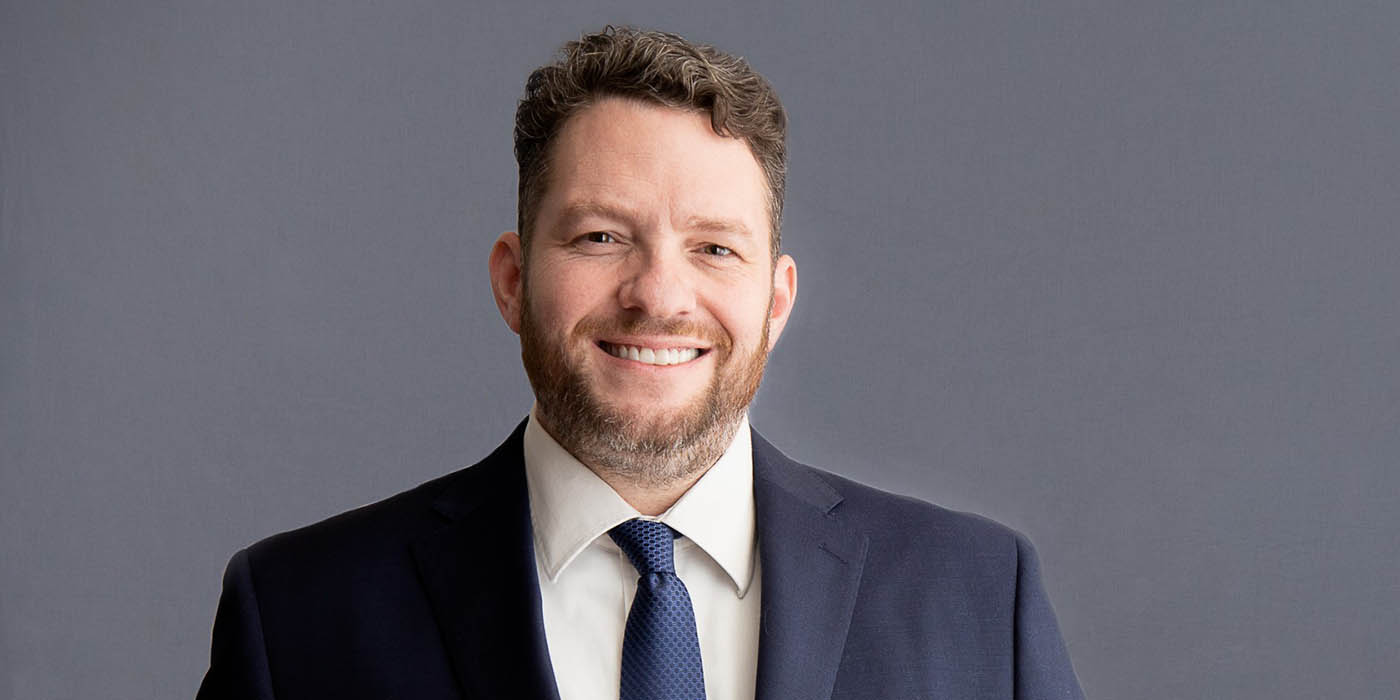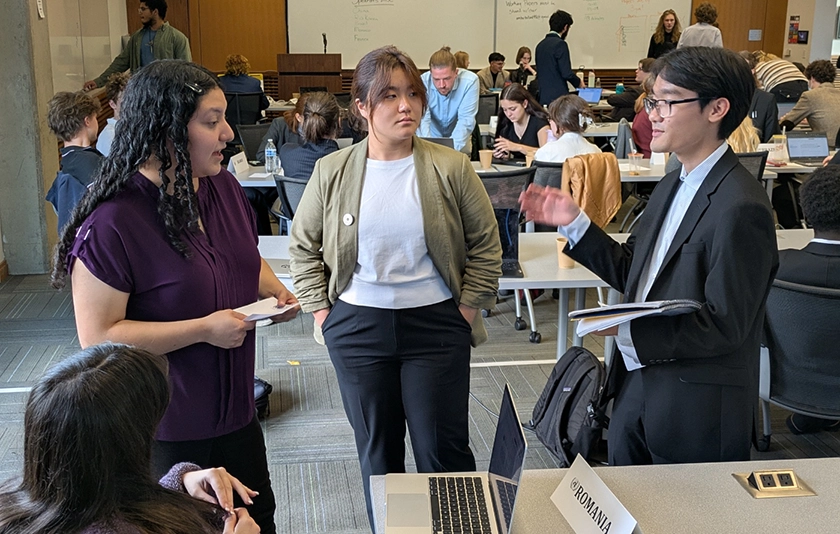“Do you want to graduate?” Geoff Winkler’s high school principal asked him in 1992. “Well, you’re not going to.”
The words were hard to swallow. It was the beginning of Winkler’s senior year. An unstable youth and his inability to play sports the previous semester killed his interest in school, so he stopped attending classes. His GPA had dropped below 1.0.
But the conversation spurred an ascent Winkler couldn’t have predicted. After years of juggling multiple priorities, he earned three degrees from Willamette University — BA ’03, JD ’06, MBA ’08 — and the first generation student is now CEO of American Fiduciary Services, a national financial management and consulting service based in Portland.
Challenging start
Raised between Keizer and a tiny farming community outside of McMinnville, Winkler was the son of two fast food workers who frequently moved, never staying in a location for more than a few years. School didn’t come easy to him, and sometimes he had to make extra effort just to get there. During eighth grade, he had to leave early in the morning and walk a mile to take a city bus to class.
Playing sports was his sole interest at McKay High School in Salem, and after an injury his junior year, he lost all motivation. But one year after that tough conversation with his principal, Winkler graduated — barely — with a 1.78 GPA. College seemed out of the question.
“Since I wasn’t very good at high school, I decided I wasn’t going to go to college,” he said. And as a first generation student, he added, “I wasn’t even sure it was an option.”
Winkler also had a family to consider. He met his wife at age 18 and his first child was born 18 months later. At the time, he worked at major electronics retailer Silo. He excelled at sales and became the youngest in store history to become assistant manager. When Silo shut down nationwide in 1995, he helped the chain sell off the inventory and discovered he had a talent for operational work.
“It just made sense to me; that’s the way my brain works. I’m very analytical,” he said. “If something isn’t working, I want to know why.”
After six years at Silo, he wanted more for his family. In 1998, he enrolled at Chemeketa Community College at age 24, took on a heavy course load and within two years, reached a 4.0 GPA with more than enough credits to transfer to Willamette. A Ford Family Foundation scholarship — one that introduced him to the late philanthropists Kenneth and Hallie Ford, co-founders of the foundation — paved the way. He enrolled as a politics major with his eyes set on a law degree.
Switching from fill-in-the-blank tests to more writing, reasoning and critical thinking was a big change for him, as was the overall age of the first-year population — everyone was so much younger. Figuring a fraternity would be the best way to connect with other students, Winkler rushed with Kappa Sigma, the first married student with children (he had two) to do so at Willamette. He had found his community and connected with professors.
“The biggest thing that scared me with the idea of a state school was where I could turn if I was struggling,” he said. “But every day at Willamette I could talk to my professors and just interact with them on a one-to-one basis. I never felt like a number.”
Finding opportunities through hard work
After graduating with a degree in politics, Winkler didn’t give up on his goal of a law degree and stayed on at Willamette to remain closer to his family. He didn’t think he could handle yet another degree when he finished law school in 2006, but Hallie Ford encouraged him to get his MBA.
Around the same time, a friend who needed some time away from Grassmueck Group in Portland asked if he could take over. Winkler worked with a receiver and bankruptcy trustee, guiding businesses out of bankruptcy while protecting investor assets. The job distilled everything he learned in law and business and put it into real practice, he said. A federal court would appoint them to take over a company, decide whether to shut it down or salvage it then maximize investor return by liquidating assets — from selling $8 million in Ferraris and Maseratis at a classic car show to auctioning off airplanes, boats or jewelry.
It was an extraordinary opportunity that sometimes interrupted his MBA classes. He once rushed out to take a call from the U.S. Securities and Exchange Commission, which connected him to a key figure in his case. It also led him to recovering $1 million for investors by selling everything the defendant owned — except for one duffle bag of belongings.
The days of skipping classes were behind him. He'd found a job that gave him rich experience, wild stories and most importantly, led to a career he loved. After he graduated with his MBA in 2008, Winkler spent seven years with Grassmueck managing various businesses then joined the Bates Group in Portland, where he continued to work for financial investors and institutions as director of financial crimes, all while teaching classes as an adjunct at Chemeketa.
In 2018, Winkler became managing director of national consulting firm Alvarez & Marsal in San Francisco. After a few years, the timing was right and he started his own firm — American Fiduciary Services — with colleague and classmate John Hall ’03, MBA ’05. Winkler also recently hired a Willamette undergraduate for an internship and hopes to make her full time.
Winkler’s is a trust-based business. His value is earned by reaching the most equitable decision for everyone, often without guidance from laws, so his employees must be able to work independently and be critical thinkers, traits he knows students learn at Willamette.
“I need employees who know when to work and when to ask questions, ones who have good judgment. You can’t really test for that,” he said. “But if I hire someone from Willamette, I know they can write well and present well and have a strong analytical mind.”
Employees of his must also have empathy, as the consequences investors experience from fraud can be devastating and widespread. When Winkler was still at Grassmueck, the company helped sustain the lives of thousands of senior citizens while recovering nearly 100% of $800 million lost in a Ponzi scheme tied to one of the nation’s largest senior housing chains, run by former Salem-based Sunwest Management. During the decade-long process, Winkler helped gain more than 100% back for some investors and achieved national recognition for his effort in 2011. Sunwest’s CEO was sentenced to 15 years in prison.
Restoring a sense of justice in innocent people drives Winkler every day. It’s heartbreaking when investors do everything right — work hard, save up for decades — but still lose it all, he said. As someone who was raised poor and watched his parents work hard at their jobs but didn’t see their lives improve, Winkler can empathize. Now he wants to help others.
“Investors would have lost their life savings if not for the work we do, so I want to do whatever we can to give back to these people,” he said. “We really make a difference in our communities and to me, that’s huge.”




